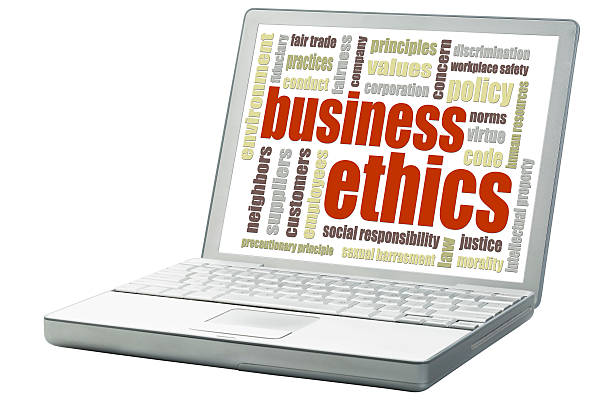Business ethics can be difficult to define, So Why Business Ethics Is Important for all of us as consumers to be mindful of the company we support. Businesses often have certain ethical guidelines that they follow in order to maintain their reputation and protect themselves from legal liability.
This article discusses why business ethics is important, including the 7 most important reasons.
What Is Business Ethics?

A business ethic is a code of conduct for employees of a business. It embodies the principles that help a company operate ethically and with integrity. Business ethics are essential to the success of any company.
Business ethics are based on four pillars:
- Honesty.
- Trust.
- Responsibility.
- Fairness.
① Honesty means being truthful in all dealings, both with customers and with coworkers.
② Trust means building and maintaining relationships of mutual respect.
③ Responsibility means taking care of your own interests and those of your company before anything else.
④ Fairness means treating everyone in a fair and equitable manner.
The best way to develop a business ethically is to start with the basics. Make sure that all communications are accurate and honest, that you treat people fairly, and that you take responsibility for your actions.
You can also look to other businesses as models of how to behave ethically.
Why Are Business Ethics Important?
When it comes to business, ethics are key. Ethics are the moral principle that helps us live our lives in a way that is good for others and ourselves. In many cases, these principles come from our personal values or morals. But sometimes, ethics come from outside sources- like the law.
For example, the law says that companies must obey government regulations. But what if there are other rules that the company wants to follow? That’s where business ethics come in.
Business ethics can outline acceptable behaviors beyond government control. They can help protect the company’s reputation and ensure that employees are following the rules that they agreed to when they joined the company.
But business ethics aren’t just about following rules- they also promote integrity among employees and build trust between companies and their customers. So, not only does business Ethics help enforce the law, but it also helps create a positive relationship between businesses and their communities.
How to Learn About Business Ethics
Business ethics is the study of what is morally and ethically acceptable behavior in business. It encompasses not just the behaviors of individuals within the company, but also the ways that a company operates as a whole.
In order to most effectively operate in an ethical manner, businesses establish formal policies and guidelines about what is and is not considered appropriate behavior.
By doing so, they create a trust-based environment where employees know that their actions will be sanctioned appropriately.
Additionally, by following established business ethics practices, companies can help strengthen their relationship with key stakeholders.
Why Business Ethics is Important

Corporations establish business ethics to promote integrity among their employees and gain the trust of key stakeholders. Business ethics establishes guidelines for employees on how to behave and think in the workplace.
It also provides guidelines for business decision-making, communication, and other interactions with others within the company.
By following these ethical companies practices, businesses promote compliance with the law and maintain public trust.
Corporate misconduct can include illegal activities such as bribery or insider trading. When misconduct is discovered, companies may face legal consequences, including fines and bans from doing business.
Businesses that commit unethical behavior may lose customers and damage their reputations.
While government regulation is important, it cannot always ensure that businesses act ethically.
For example, governments do not have the power to compel businesses to disclose information about their finances or products. Corporate ethics, therefore, play an important role in promoting compliance with the law.
By following corporate ethics policies, businesses can avoid legal problems and build trust with their customers and stakeholders.
7 Reasons why business ethics is important
- Business ethics can help prevent unethical behavior from occurring.
- Business ethics can help ensure that a company’s operations are in compliance with applicable laws and regulations.
- Business ethics can help protect a company’s reputation and goodwill.
- Business ethics can help foster a positive corporate culture.
- Business ethics can help employees adhere to the company’s values and code of conduct.
- Business ethics can help managers efficiently manage their staff and resources.
- Finally, business ethics can provide guidance to directors, officers, and shareholders on how best to conduct themselves
Why is being ethical important?
While the average person doesn’t think about it, business ethics is an important issue for any organization.
Businesses are required by law to follow certain rules when doing business with others. These rules can range from being upfront about where you get your products or services to be thoughtful enough about your customers’ privacy and security.
But being ethical decisions also means being transparent about where you get your information. What are you keeping from your customers and where are you keeping it?
How to be ethical in business
Being ethical practices in business is all about doing the right thing even if you’re not necessarily aware of how easy or hard it is to do things right.
Be aware of how much of your time and energy is being spent doing things wrong rather than doing the right thing. Be aware of where you are making a big trip on your “to do” list.
What does being ethical mean in business?
For one, being ethical means being tough on your word. If you want to be a good neighbor, then be sure to help out your family and friends.
If you want to be a good business partner, be sure to follow through on your commitments. If you want to be a good employee, be sure to treat your staff and clients with respect.
Just be sure to keep your Ethics horizon as wide as possible in the process.
What is a business ethics code?

A business ethics code is a guideline that organizations can use to protect their brand, reputation, customers, and employees.
It can be a strategic document that guides an organization’s practice of being ethical dilemmas in business.
It can also be a guideline for firms limited to staff and may include things such as not using non-restrooms in employee housing.
Why do businesses care about being ethical?
Business ethics is the branch of business administration that deals with proper and ethical business practices.
It encompasses things such as being upfront about who you are doing business with, keeping accurate and complete financial statements, not wasting money and being thoughtful enough about how you handle your customers’ money.
These are qualities that allow businesses to thrive economically and remain in business for years to come.
How to be ethical in your business
To be ethical in your business, you have to know how to be ethical in your business. This means knowing your business’s core values and being aware of the different types of businesses that follow those values.
When it comes to being ethical in your business, you have to know your business’s purpose, whether that’s growing a certain number of customers or making a certain amount of profit, and what that means for the company as a whole.
You also have to know how to be ethical in your industry and your niche, both of which can be challenging.
How Business Ethics Affect Diversity and Inclusivity in a Society
| ‣ As businesses grow, their ethical standards often expand to include diversity and inclusion. Corporate ethics help ensure that everyone in a company is treated fairly and with respect. |
| ‣ Including these values into your business culture can help improve relations with employees, customers, and the public at large. |
| ‣ It’s important to remember that not all people agree on what constitutes fair treatment. For example, some people might believe that it’s acceptable to fire someone for being transgender. |
| ‣ Others may feel that transgender employees should be allowed to keep their jobs, regardless of how they identify. |
| ‣ Regardless of how people feel about transgender employees, it’s important to create a safe and inclusive workplace for everyone. |
| ‣ This means being sensitive to different cultural beliefs, as well as individual preferences. It also means enforcing anti-discrimination policies and ensuring that all employees have access to education and training on diversity and inclusion. |
| ‣ Corporate ethics can have a big impact on social justice issues. By promoting fairness and inclusivity, businesses can help make our society more tolerant and diverse. |
How Business Ethics Can Benefit Society
Business ethics helps to maintain integrity and trust among employees, customers, and other stakeholders.
It can also improve the law by outlining acceptable behaviors beyond government control. Corporate ethics programs can help prevent unethical behavior, mitigate its effects, and promote corrective action.
For example, a company may have a policy prohibiting insider trading. If an employee is found to have engaged in this type of activity, the company has a responsibility to take appropriate action, such as terminating the employee’s employment.
By creating a policy that sets out expectations for employees, businesses can reduce the likelihood of unethical behavior occurring in the first place.
Likewise, businesses should avoid engaging in practices that could be considered fraudulent or deceptive. For example, if a business advertises discounts that are not actually available, it may be deceiving its customers.
Policies concerning fraud and deception should be carefully crafted to ensure that they are consistent with applicable law and protect the interests of both the business and its customers.
In addition to policies relating to ethical behavior, businesses should also maintain records of all dealings with customers and employees.
This information can be helpful in investigating any potential incidents of misconduct. By taking these steps, businesses can help protect themselves from potential legal problems while still promoting
The Importance of Business Ethics

The term “business ethics” is often used to describe the ethical codes of conduct that a company follows in order to maintain its ethical reputation.
Business ethics also play an important role in upholding legal standards, as they provide guidelines for acceptable behavior that go beyond government control.
incorporations establish strong business ethics to promote integrity among their employees and gain the trust of key stakeholders. This includes customers, investors, suppliers, and other members of the company’s community. Businesses also aim to maintain public trust and credibility.
The following are five key reasons why business ethics are so important:
1) They uphold legal standards.
Businesses must adhere to the law if they want to operate ethically. Codes of conduct set by a company can help ensure that its actions comply with applicable regulations.
For instance, a business may have policies prohibiting bribery or fraud. In addition, a code of conduct may require employee retention to act ethically in their dealings with customers and colleagues.
Failure to adhere to these standards can lead to legal repercussions for the company, such as fines or penalties.
2) They create a positive corporate culture.
A positive corporate culture is essential for success in today’s competitive marketplace. As part of its business plan, a company should consider how it is going to inculcate this culture.
It could do so by providing employees with new training programs or other resources that will help foster a company’s ethos. A positive corporate culture can also be achieved through maintaining high standards for employee conduct.
3) They improve the quality of life in the community.
A study by the University of British Columbia found that companies that are socially responsible have 20 percent more positive publicity than companies that are not.
4) They help the environment.
Incorporating social responsibility into a company’s business plan is far better than merely taking up some new cause, no matter how noble it may be.
When companies create and implement corporate social responsibility initiatives, they can gain greater recognition within their industries while providing benefits to the community at large.
It takes planning to develop a successful corporate social responsibility program.
5) They provide jobs to otherwise unemployed people.
Social responsibility can be a challenge for many companies which have no means of funding social services or other programs.
However, it is possible for companies to find other organizations and individuals who share the corporation’s philanthropic goals. For example, one
A Brief History of Business Ethics

Business ethics is the practice of upholding codes of conduct for businesses to prevent unethical behavior.
The concept of business ethics evolved over time and has come to encompass a variety of concepts, including corporate social responsibility, human rights, and environmentalism.
The first record of business ethics dates back to ancient Greece. In the fifth century BC, Plato wrote about the ideal society in which each individual would be motivated by self-interest.
- However, he also proposed that society should have rules in place to govern individual behavior in order to maintain a harmonious society.
- In the seventeenth century, Italian philosopher Cesare Beccaria developed the theory of laissez-faire.
- He argued that government should not intervene in business affairs because it would stifle economic growth and innovation.
- This view was opposed by Jean-Baptiste Colbert, who urged government intervention in order to promote industry and commerce.
- The early development of business ethics can be attributed to such figures as Adam Smith, John Stuart Mill, and Frederic Bastiat.
- Smith argued that self-interest should be the driving force behind the economic activity, while Mill advocated for free markets in order to promote innovation and competition. Bastiat popularized the concept of
What We Can Do Now to Promote Business Ethics
The importance of business ethics cannot be overstated. Establishing and adhering to ethical principles not only helps businesses prosper, but also helps avoid legal complications and protects employees.
It is therefore vital that businesses take the time to develop and implement sound business ethics. Here are some things that businesses can do to enhance their ethics in business:
Educate employees: Businesses must ensure that all employees are aware of the company’s ethical management standards and how they relate to their work. This can be done through briefings, manuals, or even e-learning modules.
Businesses must ensure that all employees are aware of the company’s ethical standards and how they relate to their work. This can be done through briefings, manuals, or even e-learning modules.
Train managers: Managers have a significant role in upholding ethical principles within a business.
They need to be properly trained in order to know what is permissible and what is not. This training should cover areas such as conflict resolution, whistle-blowing, and bribery prevention.
Managers have a significant role in upholding ethical principles within a business. They need to be properly trained in order to know what is permissible and what is not.
FAQ {FAQ {Frequently Asked Question}
Why Business Ethics Is Important?
Corporations establish business ethics to promote integrity among their employees and gain the trust of key stakeholders. Business ethics establishes guidelines for employees on how to behave and think in the workplace.
It also provides guidelines for business decision-making, communication, and other interactions with others within the company.
By following these ethical companies practices, businesses promote compliance with the law and maintain public trust.
Corporate misconduct can include illegal activities such as bribery or insider trading. When misconduct is discovered, companies may face legal consequences, including fines and bans from doing business.
Why Are Business Ethics Important?
When it comes to business, ethics are key. Ethics are the moral principle that helps us live our lives in a way that is good for others and ourselves. In many cases, these principles come from our personal values or morals. But sometimes, ethics come from outside sources- like the law.
For example, the law says that companies must obey government regulations. But what if there are other rules that the company wants to follow? That’s where business ethics come in.
Business ethics can outline acceptable behaviors beyond government control. They can help protect the company’s reputation and ensure that employees are following the rules that they agreed to when they joined the company.
What Is Business Ethics?
A business ethic is a code of conduct for employees of a business. It embodies the principles that help a company operate ethically and with integrity. Business ethics are essential to the success of any company.
Business ethics are based on four pillars:
Honesty.
Trust.
Responsibility.
Fairness.
How to Learn About Business Ethics
Business ethics is the study of what is morally and ethically acceptable behavior in business. It encompasses not just the behaviors of individuals within the company, but also the ways that a company operates as a whole.
In order to most effectively operate in an ethical manner, businesses establish formal policies and guidelines about what is and is not considered appropriate behavior.
By doing so, they create a trust-based environment where employees know that their actions will be sanctioned appropriately.
7 Reasons why business ethics is important
1. Business ethics can help prevent unethical behavior from occurring.
2. Business ethics can help ensure that a company’s operations are in compliance with applicable laws and 3. regulations.
3. Business ethics can help protect a company’s reputation and goodwill.
4. Business ethics can help foster a positive corporate culture.
5. Business ethics can help employees adhere to the company’s values and code of conduct.
6. Business ethics can help managers efficiently manage their staff and resources.
7. Finally, business ethics can provide guidance to directors, officers, and shareholders on how best to conduct themselves
Related Term
- A Dependable and Appealing Way for Managers
- Why Do Businesses Use Letterheads And Logos?
- Which Resource Management Task Establishes?
- Which Best Compares And Contrasts Management And Marketing?
- What is Financial Strategy | Financial Management
- Who is the principal federal official for domestic incident management?
- Which Resource Management Task Deploys or Activates Personnel And Resources
- Which Type of Business Is Strong Steel Manufacturers & Structural Steel
- How To Start Mustard Oil Business Plan
- What Is B2k Marketing | B2k Media Marketing?
- What Is B2k Marketing | B2k Media Marketing?
- What Type of Agreement Is Used To Form A Partnership Business Partnership Agreement?
- How Can The Extensibility of A Platform Benefit a Business?
- What Kind of Business Organization Are Caleb And Anna Operating Under Now?
- What Must An Entrepreneur Assume When Starting A Business Entrepreneurship?
- How Can Formal Business Documents Help Managers Solve Problems Resources
- How To Start A Tumbler Business?
- Which of The Following Statements Is True About Business Intelligence
- Why Are Slide Presentations Universal In Business Environments?
- Business Yoga In Astrology
- How To Play Business Game?
- Understand The Umbrella Branding
- Which Helps Enable An Oligopoly To Form Within A Market?
- What is Undifferentiated Marketing | Undifferentiated Marketing Strategy?
- How To Use Rural Marketing Strategies To Increase Your Business Growth
- International Marketing Research
- Features Of International Marketing
- Functions of Marketing
- Scope of Marketing Research
- What do you understand by Surrogate Marketing
- Marketing Fundamentals
- 5 Ways to Use How Can Performance Planner Serve Your Business to Achieve Your…
- Nature And Significance of Management
- Marketing Intelligence and Planning
- What Is Service Marketing Triangle
- 5 Key Facts You Need To Know About UniLink Marketing LLP
Conclusion of Why Business Ethics Is Important
Business ethics enhances the law by outlining acceptable behaviors beyond government control. Corporations establish business ethics to promote integrity among their employees and gain the trust of key stakeholders.
In order to maintain a good reputation and stay in business, businesses must abide by certain ethical principles.
These principles outline what is acceptable behavior for employees, customers, and shareholders.
Businesses that adhere to ethical principles create a trust-based environment where people are willing to do business with them.
This trust allows companies to operate without government regulation and cooperate with other organizations.
It also encourages employees to take pride in their work and behave ethically management because they know their actions have an impact on the company’s reputation.
Ethical principles provide a set of guidelines for businesses, but they are not the only factor that determines whether or not an act is considered ethical management.
The courts can also determine whether an act is ethical based on the circumstances surrounding the incident.
For example, bribery is generally not considered ethical management because it undermines the integrity of the political system. However, offering a competitive discount to a customer who votes in a certain way may be considered ethical management because it encourages customers to participate in the democratic process.
Overall, business ethics help protect companies from legal action and build
Business ethics enhances the law by outlining acceptable behaviors beyond government control.
Corporations establish business ethics to promote integrity among their employees and gain the trust of key stakeholders, including consumers.
By adhering to sound business practices, corporations can help prevent legal violations and maintain their reputation as trusted partners in society.
‣ I hope friends, through this article, I have given you information about Why Business Ethics Is Important You must have got the information. So share your suggestions with us.
Like this information Or have Something to share!
















